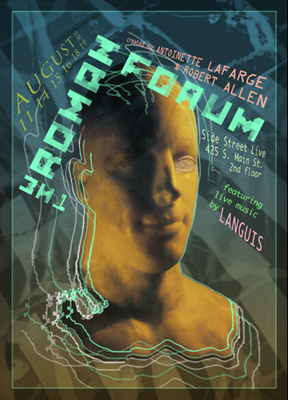 |
ROMAN FORUM DIRECTOR'S NOTES Seven days before the scheduled premiere of "The Roman Forum" we began rehearsals with the actors, the costume designer arrived from New York to begin her work, the videographer shot her first tests, and we began corresponding with the band that would provide the music and sound. Seven days! Except for some long-distance discussion about concept and some improvements to the space, we made few if any constructive decisions about the Forum until we entered that period of time when it was agreed we would all come together and 'do the deal.' Accepted wisdom tells those of us who work in the theater that seven days is a crazy, absurdly small amount of time to realize a project as ambitious as "The Roman Forum". And yet, there are exceptions: German director and stage designer Akim Freyer created an original theater work in two days that persists, even after many years, as a major inspiration in my own work; Polish director and theater innovator Jerzy Grotowsky asserted that most work would be better if the developemental period was limited to only a few days; and as a directing student under Anne Bogart I staged new work on a daily basis for an entire semester. In fact, the reality for those of us who have experience directing, designing, and acting for Downtown Theater is scant resources, insufficient tech time, and few rehearsals. Nevertheless, "The Roman Forum" did not limit itself to such a short period because it lacked time for a longer, more ordinary process. On the contrary, the imposed limitation of seven days was not only a creative choice, but one designed to challenge the artistic and spiritual resources of the Forum's creators and collaborators. It is also an essay into the nature, or the possibility of an American political theater. As an experiment of this kind, seven days does not seem an unreasonable amount of time to serve up, fresh and hot from the oven, the political catch of the day. 'Like speaks to like,' and even to begin to represent something as changeful as the 'American political process in action' requires an attitude to the theatrical process as fleeting as the political process we are seeking to illuminate. Paradoxically, we felt that this attempt also required us to turn to the unchanging past, the mythical roots of the American political spectacle, for help in seeing past the hype and into the heart of our political leaders and the institutions they serve. This method had significant impact on the theatrical conventions that we ultimately used. Originally comedy, unlike tragedy, was designed to function as an immediate response to contemporary political events. In the Classical period public figures were parodied by the clowns and comic actors of the day, thereby making the actions of political leaders the subject for criticism, review, and debate by average citizens. The value of "The Roman Forum" is not defined so much by 'newness' as by its relation to this tradition. "Out of the past cometh this new thing." Robert Allen HOME |